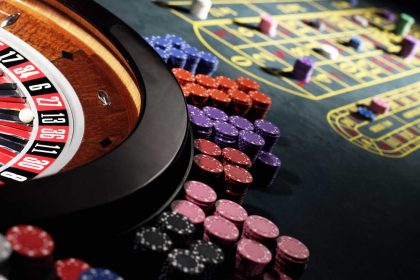Casinos are a fascinating and unique blend of entertainment, chance, psychology, and economics. Whether it’s the flashing lights of a Vegas strip or the sophisticated ambiance of a Monte Carlo establishment, m88 mobile have long captured the imagination of people worldwide. They are more than just buildings where people gamble; they are microcosms of excitement, where fortunes are made and lost, and where luck and skill intersect in unpredictable ways.
The Evolution of Casinos
The concept of the casino dates back centuries, with roots in various forms of gambling and entertainment found in ancient civilizations. However, it wasn’t until the 17th century that modern casinos began to take shape. The first recognized casino, the Casino di Venezia in Italy, opened its doors in 1638. Initially a place for entertainment, it quickly became a venue for gaming and betting.
As the popularity of casinos grew, they became integral parts of city landscapes, particularly in Europe and the United States. The grand casinos of Monte Carlo became synonymous with opulence, attracting royalty and high society. Meanwhile, in the U.S., particularly in Nevada, the allure of casinos merged with the culture of risk-taking and the promise of instant wealth. Today, places like Las Vegas and Macau are synonymous with the casino world, attracting millions of visitors each year.
The Mechanics of Gambling
At the heart of every casino is the array of games it offers, each designed to provide a different kind of thrill. From poker tables to slot machines, the games vary in complexity and the odds of winning.
- Slot Machines: These are the most popular and easiest games to play. With no strategy involved, players simply insert money, press a button, and hope for a winning combination. The odds are stacked against players, but the potential for a huge jackpot adds to the excitement.
- Poker: A game of both skill and chance, poker is one of the most complex games found in a casino. It requires not only knowledge of the game and strategies but also the ability to read opponents and manage emotions. Texas Hold’em, Omaha, and Seven-Card Stud are some of the most common variations.
- Blackjack: Known as “21,” blackjack is a card game where the objective is to get a hand value as close to 21 as possible without going over. It combines strategy with a bit of luck, and for those who are skilled in card counting, blackjack can offer better odds than many other casino games.
- Roulette: A classic game involving a spinning wheel and a ball, roulette offers a wide variety of betting options, from betting on individual numbers to more complex combinations. While roulette is a game of pure chance, the excitement of the wheel spinning and the ball bouncing adds an edge of drama.
- Craps: A dice game that might seem complicated at first glance, craps is all about placing bets on the outcome of the roll or a series of rolls. While the rules can be overwhelming for beginners, the fast-paced nature and the thrill of the roll make it a favorite for high rollers.
The Psychological Appeal
Casinos are designed with one goal in mind: to make people feel good about spending money while minimizing the sense of loss. The lighting, sounds, and layout of a casino are all meticulously crafted to create a sense of excitement. Free drinks, the hum of chatter, and the soft clink of coins are all sensory cues that encourage people to stay and play longer.
Moreover, casinos play on the psychology of risk and reward. The possibility of winning a big jackpot, even though the odds are against it, triggers a dopamine response in the brain. This feeling of reward is what drives people to keep playing, even when they’ve lost significant amounts of money.
This psychology also extends to the way casinos encourage spending. For example, most casinos offer loyalty programs, where players accumulate points that can be exchanged for free meals, hotel rooms, or even cash. These rewards, though seemingly generous, keep players engaged and motivated to continue gambling.
The Role of Technology in Modern Casinos
The landscape of gambling has changed dramatically with the advent of online casinos. What once required a trip to a physical location is now available at the click of a button. Players can enjoy their favorite games from anywhere, at any time, thanks to online platforms. Virtual casinos have democratized gambling, opening up opportunities for those who may not have access to land-based casinos.
Additionally, advancements in technology have led to the rise of sophisticated slot machines and casino games with immersive graphics and sound. Virtual reality (VR) casinos are starting to make an appearance, offering a more realistic and interactive experience. These innovations are not only drawing in new generations of gamblers but also enhancing the experience for seasoned players.
The Economic Impact of Casinos
Casinos contribute significantly to local and national economies. In cities like Las Vegas, tourism and the casino industry are central to the economic landscape. Jobs are created, local businesses benefit from the influx of visitors, and governments collect taxes from the winnings and revenues generated by casinos.
For many regions, casinos are a powerful tool for economic development. In areas where tourism is a major economic driver, the casino industry brings in billions of dollars annually. In Macau, for example, the gambling industry represents a large portion of the economy, contributing to its status as one of the richest regions in the world.
The Dark Side of Casinos
Despite the glamour and excitement associated with casinos, there is a darker side to the industry. Gambling addiction is a real and often devastating problem that affects a significant number of people. The thrill of winning can lead to compulsive gambling, where individuals risk everything for the hope of a big payout. Many casinos have measures in place to help problem gamblers, including self-exclusion programs and offering resources for those who need help.
Additionally, the immense amount of money involved in casinos has attracted concerns about money laundering and other illicit activities. Regulatory bodies and gaming commissions monitor casinos closely to ensure compliance with laws designed to prevent criminal activities.
Conclusion
Casinos are multifaceted institutions that blend chance, strategy, economics, and human psychology. While they offer unparalleled entertainment and the allure of big wins, they also carry significant risks for those who lose control. The combination of excitement, glamour, and the chance to win big has made casinos a central part of global culture. Whether you’re someone who enjoys the occasional game or someone who’s taken the thrill to the next level, casinos will continue to be a dynamic and intriguing aspect of entertainment for years to come.

